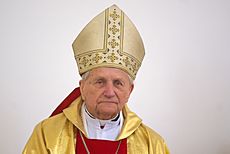Kazimierz Świątek facts for kids
Quick facts for kids His Eminence Kazimierz Świątek |
|
|---|---|
| Cardinal Archbishop of Minsk-Mohilev | |
 |
|
| Church | Roman Catholic |
| Archdiocese | Minsk-Mohilev |
| Enthroned | 21 May 1991 |
| Reign ended | 14 June 2006 |
| Predecessor | Zygmunt Konstanty Antoni Łoziński |
| Successor | Tadeusz Kondrusiewicz |
| Other posts | Cardinal-Priest of San Gerardo Maiella Apostolic Administrator of Pinsk (1991-2006) |
| Orders | |
| Ordination | 8 April 1939 |
| Consecration | 21 May 1991 |
| Created Cardinal | 26 November 1994 |
| Rank | Cardinal-Priest |
| Personal details | |
| Born | 21 October 1914 Valga, Estonia (Russian Empire) |
| Died | 21 July 2011 (aged 96) Pinsk, Belarus |
| Nationality | Estonian |
| Coat of arms |  |
Kazimierz Cardinal Świątek (born October 21, 1914 – died July 21, 2011) was an important leader in the Roman Catholic Church. He was known for standing up against the Soviet Union's communist government during the Cold War. He served as a high-ranking church official in Minsk, Belarus. Cardinal Świątek was the main Archbishop of Minsk-Mohilev and also oversaw the church in Pinsk.
Contents
Early Life and Priesthood
Kazimierz Świątek was born in 1914 in a town called Walk, which was then part of the Russian Empire. Today, this town is Valga, Estonia. His parents were Polish. During the Russian Revolution, his family was sent away to Siberia. His father bravely fought in the Polish-Soviet War and died there.
In 1922, Kazimierz moved to Poland, which had just become an independent country. He studied to become a priest at a special school called a seminary in Pinsk. In 1939, he became a Roman Catholic priest. After that, he was sent to work in a church parish in a town called Pruzhany.
Facing Hardship: Arrests and Imprisonment
In 1939, the Soviet Union took control of Pinsk. In April 1941, Kazimierz Świątek was arrested by the NKVD, which was the Soviet secret police. He was held in a prison in Brest and was even sentenced to death.
However, he managed to escape from prison in June 1941. This happened during the confusion when Nazi Germany invaded the Soviet Union. He then returned to Pruzhany. But in December 1944, the NKVD arrested him again. The next year, he was sentenced to 10 years of hard labor in a Gulag, which was a Soviet forced labor camp.
He spent nine years in very harsh conditions in Siberia and other northern parts of the Soviet Union. He had to work in forests (called the taiga) and in mines. Finally, in June 1954, he was released and went back to Pinsk.
Leading the Church in Belarus
In 1988, Pope John Paul II gave him the special title of Monsignor. This is an honorary title for a priest. Then, in 1991, the Pope appointed him as the main Archbishop of Minsk-Mohilev. He also became the temporary leader, called an Apostolic Administrator, for the church in Pinsk.
On November 26, 1994, Pope John Paul II made him a Cardinal-Priest. This is a very high position in the Catholic Church. He was also chosen to be the first President of the Episcopal Conference of Belarus. This group helps lead the Catholic Church in Belarus. This showed his important role in the church there.
Later Years and Legacy
In July 2006, Cardinal Świątek was 91 years old. He decided to step down from his role as Archbishop of Minsk-Mohilev because of his age and health. Pope Benedict XVI accepted his resignation. However, he continued to serve as the Apostolic Administrator of Pinsk until June 30, 2011. After that, Tadeusz Kondrusiewicz took over his roles.
Death
Cardinal Świątek passed away on July 21, 2011, in Pinsk, after a long illness. He was 96 years old. At the time of his death, he was the second oldest member of the College of Cardinals, which is the group of all cardinals.
Pope Benedict XVI sent a message to express his sadness about the Cardinal's death. He praised Cardinal Świątek for his many years of service. The Pope also honored his strong faith and loyalty to the Church and to Christ, especially during his time in prison during the early years of the Cold War. During that period, the Church in the Soviet Union often had to operate in secret.
Images for kids
See also
 In Spanish: Casimir Świątek para niños
In Spanish: Casimir Świątek para niños



